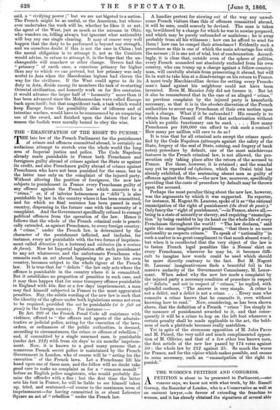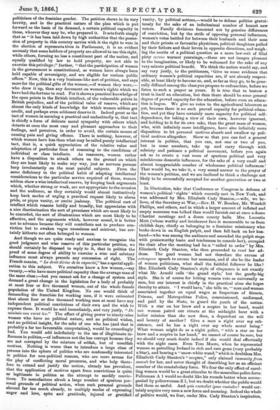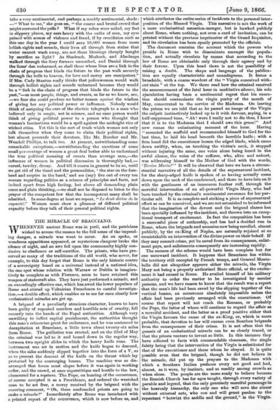THE WOMEN'S PETITION AND CONGRESS.
A PETITION is about to be presented to Parliament,—one LI rumour says, we know not with what truth, by Mr. Russell Gurney, the Recorder of London, who is a Conservative as well as an eminent lawyer,—in favour of extending the franchise to women, and it has already obtained the signatures of several able politicians of the feminine gender. The petition shows in its very brevity, and in the practical nature of the plan which is put forward as the basis of its demand, a certain political capacity in those, whoever they may be, who prepared it. It sets forth simply that as "it has been laid down by high authorities that the posses- sion a property in this country carries with it the right to vote in the election of representatives in Parliament, it is an evident anomaly that some holders of property are allowed to use this right, while others, forming no less a constituent part of the nation, and equally qualified by law to hold property, are not able to exercise this privilege ;" further, "that the participation of women in the government is constitutional, as women have always been held capable of sovereignty, and are eligible for various public offices." Now, this is a very business-like sort of petition, and says more for the political gifts of the women,—if women they were,— who drew it up, than any document on women's rights which we have had the fortune to read. For it shows a practical knowledge of the open points in the British intellect, of the vulnerable points in British prejudice, and of the political value of reserve, which are almost the only kinds of knowledge for which women seldom get credit, and perhaps even seldomer deserve it. Indeed great as the tact of women in securing a practical end undoubtedly is, that tact is chiefly a form of delicate moral sympathy with others which detects at once the most easy and pleasant approaches to their feelings, and perceives, in order to avoid, the certain means of causing pain and giving offence. There is nothing, however, of which women have less than what may be called purely intellectual tact, that is, a quick appreciation of the relative value and adaptation of particular lines of reasoning to the conditions of individual or class intellects. As reasoners, women rather have a disposition to attack others on the ground on which they are least likely to make any way, just as nervous persona harp involuntarily on the most painful subjects. From the same deficiency in the political habit of adapting intellectual considerations to the particular service required of them, women seldom show a wise intellectual reserve, by keeping back arguments which, whether strong or weak, are not appropriate to the occasion and the audience, as they certainly would almost instinctively keep back modes of urging a practical request likely, to alarm pride, or pique vanity, or excite jealousy. The political cast of intellect which reasons boldly and broadly, but appreciates with a nice discrimination the sort of premisses which are most likely to be conceded, the sort of illustrations which are most likely to be effective, and the arguments which, however sound, it is better not to advance because they will contribute not to produce con- viction but to awaken vague uneasiness and miatrust, has cer- tainly hitherto not often belonged to women.
And though we are quite ready and anxious to recognize the good judgment and wise reserve of this particular petition, we should certainly be disposed to reply to it, that in politics the proof of some degree of ability to exercise a wise and salutary influence must always precede any concession of right. The French maxim, "Le droit derive de in capaciti," has a special appli- cation to this subject. We ourselves know a few women,—say twenty,—who have more political capacity than the average man of the same class ;—but you cannot ask for a change of system and demands great change in the legislation for a body of probably at most four or five thousand women, out of the whole female population of the United Kingdom. No one would think of demanding the franchise for working men, if it were estimated that about four or five thousand working men at most have any independent political convictions of their own and the wish to express them. It would be said immediately, and very justly, "De minimis non curat lex." The effect of giving power to ninety-nine women who have no political nature, and no political wishes, and no political insight, for the sake of one who has (and that is probably a far too favourable computation), would be exceedingly bad. You would add indefinitely to the use of illegitimate in- fluences in politics,—of influences not the less corrupt because they are not corrupted by the mixture of selfish, but of unselfish motives. Nothing is worse than to introduce a large class of persons into the sphere of politics who are confessedly interested in politics for non-political reasons, who are mere arenas for the play of conflicting moral pressures, and who help there- fore to extend and justify the notion, already too prevalent, that the application of motives apart from convictions is quite as legitimate in politics as the attempt to modify convic- tions. To manufacture afresh a large number of spurious per- sonal grounds of political action, when such personal grounds abound far too much already, to multiply modes of expressing anger and love, spite and gratitude, injured or gratified
vanity, by political actions,—would be to debase politics gratui- tously for the sake of an infinitesimal number of honest new voters. Family divisions fomented not by genuine differences of conviction, but by the strife of opposing personal influences, women's votes battled for between their husbands and their sons and their priests or favourite physicians, political daughters pulled by their fathers and their lovers in opposite directions, and weigh- ing the merits of a political question as a mere law-suit of filial piety versus warmer yearnings,—these are not images pleasant to the imagination, or likely to be welcomed for the sake of any very minute political benefit. We think the nation would say, and say very justly, to the petitioners, Give us some evidence that ordinary women's political capacities are, if not already respect- able, at least likely to become so, and, so far as they go, to be gene- rally diffused among the class you propose to enfranchise, before we listen to such a prayer as yours. It is true that to bestow a trust is itself an education, but then there should be some general degree of proved capacity for the education, before even an educa- tion is begun. We give no votes to the agricultural labourers as yet, because there is no such proved capacity for political educa- tion, and yet they have certainly more capacity for political self- dependence, for taking a view of their own, however ignorant, and holding to it for its own sake, than the great mass of women, who, with infinitely more intelligence, have also infinitely more disposition to let personal motives absorb and swallow up poli- tical motives altogether. Show us that you can feel a general interest in politics, that you can, not one or two of you, but in some numbers, take up and carry through with sobriety and patience a political movement, before you again ask us to create a vast mass of spurious political and very mischievous domestic influences, for the sake of a very small and almost inappreciable number of wholesome political influences.' That would be, we take it, a very sound answer to the prayer of the women's petition, and we are inclined to think a challenge not likely to be successfully accepted for another generation or two at least.
In illustration, take that Conference or Congress in defence of women's political 'rights' which recently met in New York, and was addressed by Mrs. Elizabeth Cady Stanton,—wife, we be- lieve, of the Secretary at War,—Rev. H. W. Beecher, Mr. Wendell Phillips, and others, and in which a larger amount of inflated and empty nonsense was talked than would furnish out at once a dozen Chartist meetings and a dozen county balls. Mrs. Lucretia Mott (whose worthy and incoherent face is memorable to us from childish days, chiefly as belonging to a feminine missionary who, broke down in an English pulpit, and then fell back on her hus- band—who was among the audience and ascended the pulpit steps with praiseworthy haste and tenderness to console her), occupied the chair after the meeting had hem "called to order" by Mrs. Elizabeth Cady Stanton, who then proceeded to read her ad- dress. The good woman had not therefore the excuse of extempore speech to excuse her nonsense, and if she be the leader of women politicians, what shall the faithful follower be like? Mrs. Elizabeth Cady Stanton's style of eloquence is not exactly what Mr. Arnold calls the grand style,' but the gaudy-big style. She is of course for letting women vote as universally as men, but our interest is chiefly in the practical aims she hopes thereby to attain. "I would have," she tells us, "man and woman associated together on equal wages as Inspectors of Streets, Prisons, and Metropolitan Police, commissioned, uniformed, and paid by the State, to guard the youth of the nation. With a star on her brow and a sceptre in her hand, would not woman patrol our streets at the midnight hour with a holier mission than she now does, a dependent on the will and bounty of another? Give a man a right over my sub- sistence, and he has a right over my whole moral being." What woman might do as a night police, "with a star on her brow and a sceptre in her hand," we cannot of course be sure, but we should very much doubt indeed if she would deal effectually with the night cases. Even Tom Moore, when he represented woman as patrolling Ireland in rich and rare gems (very probably a Star), and bearing a "snow-white wand," which is doubtless Mrs. Elizabeth Cady Stanton's "sceptre," only claimed immunity from assault for her, and never thought of describing her as an efficient member of the constabulary force. We fear the only effect of enrol- ling women would be a great stimulus to the masculine police force. Policeman A 1 would no doubt like his rounds better when accom- panied by policewoman Z 1, but we doubt whether the public would find them so useful. And guilt custodiet ipsos custodes? would cer- tainly acquire very soon a new force and meaning. Indeed the whole of politics would, we fear, under Mrs. Cady Stanton's inspiration, take a very sentimental, and perhaps a muddy sentimental, shade: What to me," she goes on, "the coarse and brutal crowd that might surround the polls ? What if nay robes were soiled, my feet
in slippery places, my ears heavy with the oaths of men, my eyes pained with scenes of violence and fraud, if by crucifixion such as this one day in the year I could save 10,000 women from more hellish sights and sounds, their lives all through from stains that water cannot wash away, are not these blessings cheaply bought by sacrifice so light ? As Shadrach, bleshach, and Abednego
walked through the fiery furnace unscathed, and Daniel through the lions' den unharmed, so shall those whose lives are a link in the chain of progress that binds the future to the past walk securely through the hells to heaven, for love and mercy are omnipotent." If Mrs. Cady Stanton really thinks that policewomen would walk through hellish sights and sounds unharmed because they would be a "link in the chain of progress that binds the future to the past,"—as most people, things, and events, as far as we know, are, —we fear she could produce no better reason against the wisdom of giving her any political power or influence. Nobody would think of assigning the care of the electric telegraph to a man who believed only in magic, not in science, and no sane person would think of giving political power to a person who thought that woman's fascinations would be a spell against the midnight vice of wicked cities. Yet this is the sort of trash which women not only talk themselves when they come to claim their political rights, but almost persuade their devotees, like Mr. Beecher and Mr. Wendell Phillips, to talk too. At present, notwithstanding some remarkable exceptions,—notwithstanding the exertions of some small per-centage of women a great deal better able to understand the true political meaning of events than average men,—the influence of women in political discussion is thoroughly bad,— unreal, tawdry, dressy. And till it ceases in general to be so, until we get rid of the tinsel and the personalities, 'the star on the fore- head and sceptre in the hand,' and see (say) five out of every ten women regarding politics as a science of principles and facts, not indeed apart from high feeling, but above all demanding plain sense and plain thinking,—we shall not be disposed to listen to the. prayer of the competent few that the incompetent many shall be admitted. In some degree at least we repeat, "Le droit derive de in eapaeiti." Women must show a glimmer of diffused political capacity before they talk of their general political rights.
































 Previous page
Previous page